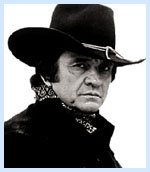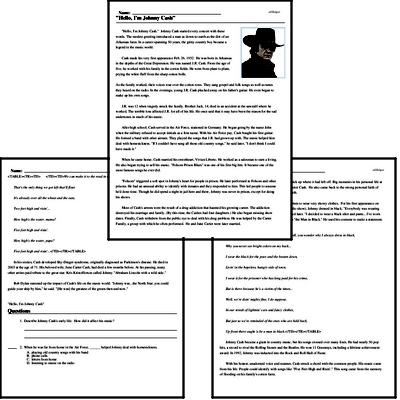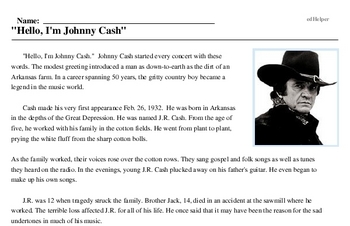"Hello, I'm Johnny Cash"
Johnny Cash
Reading Comprehension for February 26
"Hello, I'm Johnny Cash." Johnny Cash started every concert with these words. The modest greeting introduced a man as down-to-earth as the dirt of an Arkansas farm. In a career spanning 50 years, the gritty country boy became a legend in the music world.
Cash made his very first appearance Feb. 26, 1932. He was born in Arkansas in the depths of the Great Depression. He was named J.R. Cash. From the age of five, he worked with his family in the cotton fields. He went from plant to plant, prying the white fluff from the sharp cotton bolls.
As the family worked, their voices rose over the cotton rows. They sang gospel and folk songs as well as tunes they heard on the radio. In the evenings, young J.R. Cash plucked away on his father's guitar. He even began to make up his own songs.
J.R. was 12 when tragedy struck the family. Brother Jack, 14, died in an accident at the sawmill where he worked. The terrible loss affected J.R. for all of his life. He once said that it may have been the reason for the sad undertones in much of his music.
After high school, Cash served in the Air Force, stationed in Germany. He began going by the name John when the military refused to accept initials as a first name. With his Air Force pay, Cash bought his first guitar. He formed a band with other airmen. They played the songs that J.R. had grown up with. The music helped him deal with homesickness. "If I couldn't have sung all those old country songs," he said later, "I don't think I could have made it."
When he came home, Cash married his sweetheart, Vivian Liberto. He worked as a salesman to earn a living. He also began trying to sell his music. "Folsom Prison Blues" was one of his first big hits. It became one of the most famous songs he ever did.
"Folsom" triggered a soft spot in Johnny's heart for people in prison. He later performed at Folsom and other prisons. He had an unusual ability to identify with inmates and they responded to him. This led people to assume he'd done time. Though he did spend a night in jail here and there, Johnny was never in prison, except for doing his shows.
Most of Cash's arrests were the result of a drug addiction that haunted his growing career. The addiction destroyed his marriage and family. (By this time, the Cashes had four daughters.) He also began missing show dates. Finally, Cash withdrew from the public eye to deal with his drug problem. He was helped by the Carter Family, a group with which he often performed. He and June Carter were later married.
After his recovery, Johnny's career seemed to pick up where it had left off. Big moments in his personal life at this time included the birth of his only son, John Carter Cash. He also came back to the strong personal faith of his youth. The rest of his life was buoyed by this faith.
Trends in country music at the time were for artists to wear very showy clothes. For his first appearance on the Grand Ole Opry, (a country music stage and radio show), Johnny dressed in black. "Everybody was wearing rhinestones, all those sparkle clothes...," he explained later. "I decided to wear a black shirt and pants... I've worn black clothes ever since." Johnny became known as "the Man in Black." He used his costume to make a statement. In a song he wrote:
| Well, you wonder why I always dress in black, Why you never see bright colors on my back... I wear the black for the poor and the beaten down, Livin' in the hopeless, hungry side of town, |


 reading comprehension." title="Print "Hello, I'm Johnny Cash" reading comprehension." class="c-worksheets__img">
reading comprehension." title="Print "Hello, I'm Johnny Cash" reading comprehension." class="c-worksheets__img">
 reading comprehension." class="c-worksheets__img">
reading comprehension." class="c-worksheets__img">